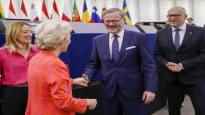The Czech Republic, acting as EU president for the second time, has to deal with the effects of the energy crisis on the everyday lives of Europeans. The country is also dependent on oil and gas imported from Russia.
BRUSSELS Where do you get electricity and heating for the winter cold? Here is the number one challenge for the Czech Republic, which started its EU presidency in July.
Geographical location complicates the position of the Czech Republic. It is difficult to replace gas and oil brought through the pipeline in the short term. If Russia shuts off the gas taps, the Czech Republic will rely on the solidarity of other member states.
Support is available (you will switch to another service)assured the German Minister of Economy and Climate, who visited Prague on Monday Robert Habeck. In fact, Germany is also rattled by its energy dependence. In winter, there is perhaps only scarcity to be shared between EU countries.
Russia’s attack on Ukraine defines part of the Czech presidency. It is difficult to find indications of a quick end to the war. The EU has to prepare for the fact that the fighting in Ukraine will continue for a long time.
The attitude is influenced by the Czech historical experience of being in the Soviet Union’s favor as well as a practical consideration: Ukrainians are a welcome addition to industries suffering from labor shortages.
The integration of refugees is facilitated by the large Ukrainian community already living in the Czech Republic and the relative similarity of the Czech and Ukrainian languages.
The Czech Republic is also, considering its size, a significant provider of arms aid to Ukraine. It is expected that in the coming months the EU will make decisions on increasing the arms aid channeled through the EU Peace Fund.
The Czech Presidency is to be expected distortion of the EU’s basic values. Suffering from financial worries, Hungary harbors hopes for the release of its own stimulus money. It is a support pot of around seven billion.
Already in the spring, the Commission opened the door to the approval of Poland’s stimulus package. The condition is that Poland implements the reforms it promised to strengthen the rule of law. Hungary hopes that its own stimulus package will advance, led by Poland.
Hungary can blackmail other EU countries by putting the brakes on decisions that require unanimity, such as sanctions. In the second horizontal cup is the credibility of the EU’s common values. The concern is that Hungary will receive its stimulus money without the required reforms.
The Czech Republic has traditionally had warm relations with both Poland and Hungary.
Together with Slovakia, the countries form a so-called Visegrád Quadrilateral (switch to another service)which has been combined, among other things, by a critical attitude towards the common immigration policy and climate policy perceived as too ambitious.
However, after the Russian attack, there have been wrinkles in the mutual love: Hungary’s trickery in deciding on sanctions against Russia has not been viewed favorably in the other Visegrád countries.
Despite the cooling of relations, the Czech Republic can hardly be expected to let go of Hungary. The Presidency hopes that a solution to the dispute over Hungary’s stimulus money will be found through negotiations.
The Czech presidency coincides with an interesting one to the security policy seam. Investments in joint arms assistance have been seen as a step towards closer European defense cooperation. At the same time, NATO is also strengthening its positions in the eastern member countries.
I talked to the foreign minister in Prague Jan Lipavský, which emphasized the importance of strategic unity between NATO and the EU. During its presidency, the Czech Republic promotes the adoption of a joint statement between the EU and NATO, which aims to outline the deepening of cooperation.
Lipavský is happy about the NATO membership of Finland and Sweden, which will also strengthen the security of Central Europe.
The Czech parliament is expected to ratify, i.e. approve, the accession protocols of Finland and Sweden in early autumn, right after the summer break.
Politically, according to Lipavský, the ratification is a farce.
What thoughts does the story evoke in you? You can discuss the topic until Thursday, July 14 at 11 p.m.
